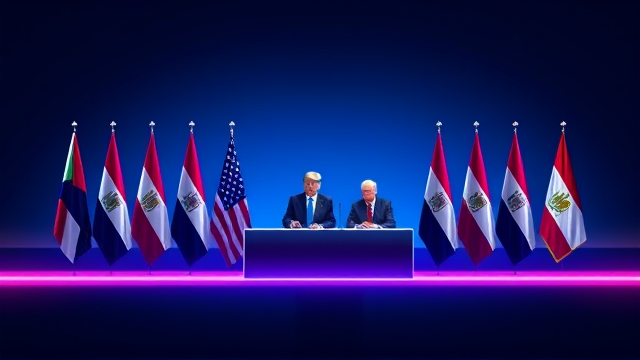Trump Signs Initial Gaza Ceasefire Deal in Egypt.
In a move that will be scrutinized by historians for its geopolitical weight, the initial phase of a Gaza ceasefire deal was formally signed in Sharm el-Sheikh, Egypt, with US President Donald Trump standing alongside a cadre of world leaders whose collective presence signals a fragile, yet monumental, step toward de-escalating a conflict that has ravaged the region for generations. This diplomatic maneuver, reminiscent of the high-stakes summits that defined the late 20th century, is not merely a piece of paper but a testament to the arduous, behind-the-scenes statecraft that often goes unseen by the public.The choice of Egypt as the staging ground is itself deeply symbolic, harkening back to the Camp David Accords and underscoring the nation's perennial role as a mediator in the turbulent theater of Middle Eastern politics. While the specific contours of this 'first phase' remain cloaked in the cautious language of diplomatic communiqués, informed sources suggest it primarily establishes a humanitarian corridor and a tentative cessation of hostilities, a necessary but precarious foundation upon which the more complex architecture of a lasting peace must be built.One must consider the immense pressure on all parties: for the Israeli government, the internal political schisms over security versus reconciliation; for the Palestinian leadership, the challenge of presenting any agreement as a victory to a populace weary of conflict; and for the Trump administration, a foreign policy win that seeks to recalibrate America's often-contradictory role as both an ally and a broker. The ghosts of failed agreements past, from Oslo to various Egyptian and Qatari-brokered truces, loom large over these proceedings, serving as a stark reminder that signatures are the easy part—the implementation, oversight, and cultivation of trust on the ground is where these ventures historically falter.Analysts are already debating the potential consequences, with optimistic scenarios envisioning a slow, painful march toward normalized relations and economic development for Gaza, while pessimistic forecasts warn of a mere tactical pause, allowing factions to rearm and regroup for the next inevitable confrontation. The involvement of other global powers, each with their own strategic interests in the Eastern Mediterranean, adds another layer of complexity, ensuring that the path forward will be fraught with challenges that would test even a Churchillian resolve for perseverance in the face of long odds. Ultimately, this day in Sharm el-Sheikh will be recorded not as an end, but as a profoundly significant beginning, the first move in a high-stakes diplomatic chess game where every subsequent move will determine whether this fragile truce evolves into a durable peace or simply becomes another footnote in the long, tragic history of the conflict.
Latest News
The political theater outside Westminster Magistrates' Court unfolded with predictable precision Monday morning, as far-right organizer Tommy Robinson—real
14 minutes ago0 comments
In a move that echoes the gravest moments of the Cold War, Britain’s domestic intelligence service, MI5, has issued a stark and unusually public warning to the
44 minutes ago0 comments
In a move that will undoubtedly be recorded by future historians as a pivotal moment in the long and tortured history of the Middle East, President Donald
49 minutes ago0 comments
In a move that underscores the deeply personal and often cyclical nature of political influence, Labour has appointed Matthew Taylor, the architect of the
1 hour ago0 comments
In a high-stakes maneuver that recalibrates the geopolitical risk profile of the entire Levant, the long-anticipated prisoner and hostage exchange between
1 hour ago0 comments
The political battlefield erupted this weekend when George Finch, the 19-year-old Reform UK leader of Warwickshire county council and the UK's youngest council
2 hours ago1 comments
In a move that will undoubtedly be dissected by historians and political strategists for years to come, President Trump has formally signed a Gaza peace plan,
3 hours ago1 comments
In a move that will be scrutinized by historians for its geopolitical weight, the initial phase of a Gaza ceasefire deal was formally signed in Sharm
3 hours ago0 comments
It’s quiet here...Start the conversation by leaving the first comment.
